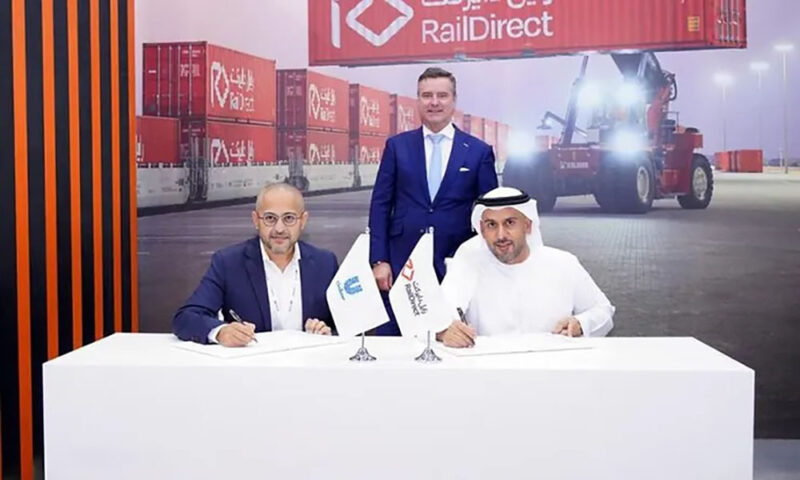DHL and Etihad Rail Collaborate with Unilever to Reduce CO2 Emissions

DHL, Etihad Rail, and Unilever Team Up for Greener Logistics in the UAE
October 24, 2024 – Global Rail 2024 showcased a significant step towards sustainable logistics as DHL Global Forwarding, Etihad Rail, and Unilever announced a remarkable partnership. With an objective to reduce carbon emissions in its logistics operations across the UAE, this initiative is poised to make a significant impact on global efforts toward sustainability and climate responsibility.
At the heart of this collaboration are the innovative services offered by RailDirect, a subsidiary of Etihad Rail. This venture illustrates a growing trend among corporations to integrate environmentally-friendly practices into their logistics and supply chain management. Unilever, known for its commitment to sustainability, aims to cut its greenhouse gas (GHG) emissions per consumer use by 50% by 2030 and achieve net-zero emissions across its entire value chain by 2039.
A Green Initiative with Global Implications
The partnership was formally announced at the notable Global Rail 2024 event, which gathered industry leaders and stakeholders to discuss advancements in rail transport and logistics. During the signing ceremony, Tariq Alfalahi, CEO of RailDirect, emphasized the significance of this alliance, stating, “By integrating our advanced rail freight services, we are poised to reduce the carbon footprint of Unilever’s logistics operations in the UAE. This alliance not only underscores our commitment to sustainable innovation but also aligns with Unilever’s goals for emissions reduction.”
Unilever’s commitment to tackling climate change is not new. The company has been working on various sustainability initiatives over the years, launching several eco-friendly products, emphasizing sustainable sourcing of raw materials, and implementing waste reduction strategies in its manufacturing processes. This latest partnership further cements Unilever’s position as a leader in corporate sustainability, particularly in the region.
The Role of Rail in Sustainable Logistics
Rail transport is renowned for being a more efficient and less carbon-intensive mode of transportation compared to road freight. By utilizing RailDirect’s services, which are designed to optimize the logistics process, Unilever is taking a proactive approach to meet its ambitious emissions reduction targets. The collaboration will enable the multinational food and consumer goods company to shift a significant volume of its transport from road to rail, which is expected to substantially decrease the carbon emissions generated during the transit of its products.
The environmental benefits of this shift are multifold. Rail transport not only results in lower greenhouse gas emissions but also decreases traffic congestion on highways, reduces road wear and tear, and enhances overall logistics efficiency. The integration of these rail services align with international trends where businesses are increasingly held accountable for their carbon footprint and are being urged to adopt sustainable practices.
Industry Outlook and Future Directions
This partnership comes at a time when many businesses are reassessing their logistics frameworks in light of the global shift towards sustainability. The UAE has set ambitious targets to reduce its carbon emissions as part of its larger vision for sustainable development and economic diversification. As a vital part of this vision, rail transport plays a critical role in reducing the environmental impact of freight logistics. The UAE government has been pouring investments into its rail infrastructure, and with partnerships like the one between DHL, Etihad Rail, and Unilever, the potential for change just begins to scratch the surface.
Moreover, the private sector’s collaborative efforts are crucial in achieving shared sustainability goals. This partnership not only highlights the responsibility of corporations to minimize their environmental impact but also underscores the importance of collaborative innovation in finding solutions to global challenges like climate change.
Conclusion
In conclusion, the collaboration between DHL, Etihad Rail, and Unilever is a testament to how three industry leaders can come together for a sustainable cause. By reducing the carbon footprint of logistics operations in the UAE, this partnership is a significant step toward creating a more sustainable supply chain framework.
As other corporations look to follow suit, the hope is that this collaboration will spark a ripple effect within the logistics sector, where efficiency and sustainability go hand in hand. For residents of the UAE and beyond, these changes could lead to enhanced corporate responsibility and a healthier planet.
Tags
#BusinessNews #EconomyNews #UAE #Sustainability #Logistics #GreenInitiatives #CorporateResponsibility







